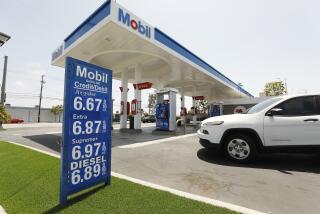You Say Gas Prices Are Up? Let the Political Games Begin
- Share via
Saying he’s concerned over rising gasoline prices, President Clinton has told the Energy Department to begin selling 12 million barrels of oil from the Strategic Petroleum Reserve, the nation’s 597-million-barrel cushion against any major loss of oil imports. The most notable feature of this action is its irrelevance.
The oil to be sold is equivalent to less than three-fourths of a single day’s total demand. Released over three or four weeks, it would have a barely measurable impact on gasoline supplies. In any case Clinton is only trying to make a political virtue out of a legislative necessity: Congress had earlier ordered him to sell $227 million worth of oil to fund some education programs the administration wants to continue.
Trying to extract political gain from the run-up in gasoline prices is not, of course, a White House monopoly. Republicans are rushing to take advantage of public ire by moving to repeal the surcharge of 4.3 cents a gallon on gasoline that Congress enacted in 1993 as part of a deficit reduction package. Sen. Phil Gramm (R-Texas) grossly exaggerates when he claims that eliminating the tax would save the typical American driver $1 with every fill-up. What is known is that each penny of the gasoline tax rate brings the Treasury a little over $1 billion a year. How would Gramm compensate for the loss of about $4.8 billion that repeal of the surcharge would produce? In part, by further laying the lash on everyone’s favorite whipping boy, cutting welfare benefits to legal immigrants still more.
Democrats in Congress allege the real problem behind the soaring costs isn’t a tax surcharge that few motorists have even known they were paying over the last three years but oil industry profiteering. Congressional Democrats have now also got the Justice Department to open an investigation into the reasons for the price run-up. If collusion is found, prosecutions could follow. But the first thing the department will be looking at is the role of market forces.
There’s no doubt that a combination of circumstances has contributed to substantial increases in pump prices. A harsh winter that prolonged demand for heating oil in the nation’s cold belt delayed output of gasoline at refineries. Increasing sales of fuel-hungry vehicles and higher speed limits have helped hike gasoline demand. Meanwhile, crude oil inventories have been run down in anticipation of an increase in international supplies and lower costs. Finally, several temporary refinery shutdowns in California, along with the higher costs of producing cleaner-burning fuel, have made the problem especially acute here.
None of this, of course, means there might not have been some opportunistic price gouging by oil companies. Neither does any of it warrant opportunistic politicking. In the main, market forces seem to be the big reason for the higher prices, and before too long those same forces will probably push prices down. Pending that, there’s no need to tap into the strategic reserve, or to cut needed gasoline taxes.
More to Read
Get the L.A. Times Politics newsletter
Deeply reported insights into legislation, politics and policy from Sacramento, Washington and beyond. In your inbox twice per week.
You may occasionally receive promotional content from the Los Angeles Times.










